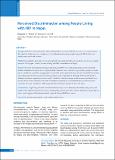Please use this identifier to cite or link to this item:
https://hdl.handle.net/20.500.14356/1925| Title: | Perceived Discrimination among People Living with HIV in Nepal |
| Authors: | Neupane, D Khanal, V Sharma, S Aro, A R |
| Citation: | NeupaneD., KhanalV., SharmaS., & AroA. R. (2012). Perceived Discrimination among People Living with HIV in Nepal. Journal of Nepal Health Research Council. https://doi.org/10.33314/jnhrc.v0i0.313 |
| Issue Date: | 2012 |
| Publisher: | Nepal Health Research Council |
| Article Type: | Original Article |
| Keywords: | Discrimination Family Health facilities HIV Society |
| Series/Report no.: | May-Aug, 2012;313 |
| Abstract: | Abstract Background: HIV is one of the major public health problems in Nepal, fuelled by several socio-economic factors. The objective of this study was to explore perceived discrimination among people living with HIV in their own family, society and health facilities. Methods: A qualitative descriptive cross-sectional study was conducted with semi-structured face-to-face in-depth interview of 18 people (10 men, 8 women) living with HIV in four districts of Nepal. Results: Perceived discriminations among people living with HIV were found among family, society and health facilities. In families, the major forms of perceived discrimination were restriction to go outside, exposure to media and use of different utensils for eating purpose. Female HIV positive perceived more violence at household level than males. Financial restriction was also found imposed upon some respondents by the family for being HIV positive. Similarly, restriction to participate in social work, restriction to buy from shops, social harassment and insult were the main forms of discrimination. Perceived discrimination experienced in the health facility yielded very bitter experiences to some respondents, while many had refused treatment because of their HIV status. Conclusions: People living with HIV faced different forms of perceived discrimination within family, society and health facility which are thought to be crucial in supporting a person at the time of crisis. Intensive programs that can reduce social stigma and discrimination faced by people living with HIV are a most. Keywords: discrimination; family; health facilities; HIV; society. |
| Description: | Original Article |
| URI: | http://103.69.126.140:8080/handle/20.500.14356/1925 |
| ISSN: | Print ISSN: 1727-5482; Online ISSN: 1999-6217 |
| Appears in Collections: | Vol 10 No 2 Issue 21 May - Aug, 2012 |
Files in This Item:
| File | Description | Size | Format | |
|---|---|---|---|---|
| 313-Article Text-312-1-10-20130823.pdf | Fulltext Download | 353.85 kB | Adobe PDF |  View/Open |
Items in DSpace are protected by copyright, with all rights reserved, unless otherwise indicated.
